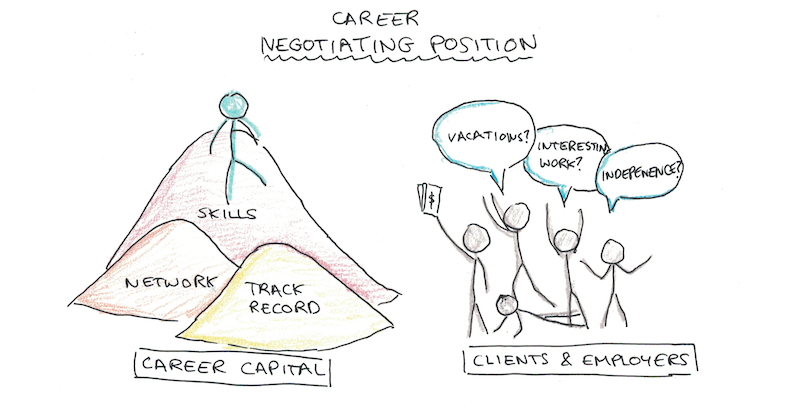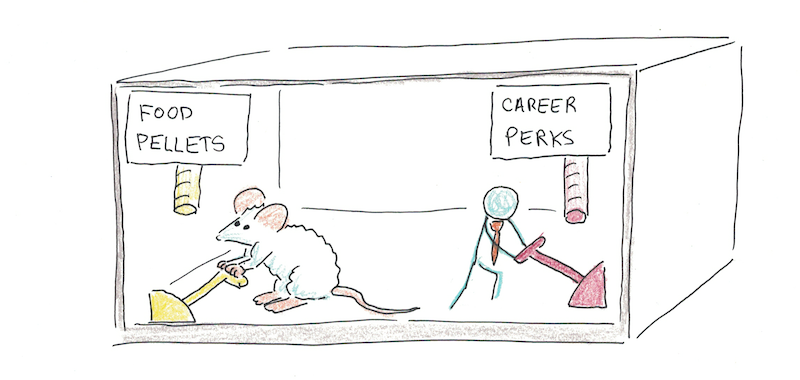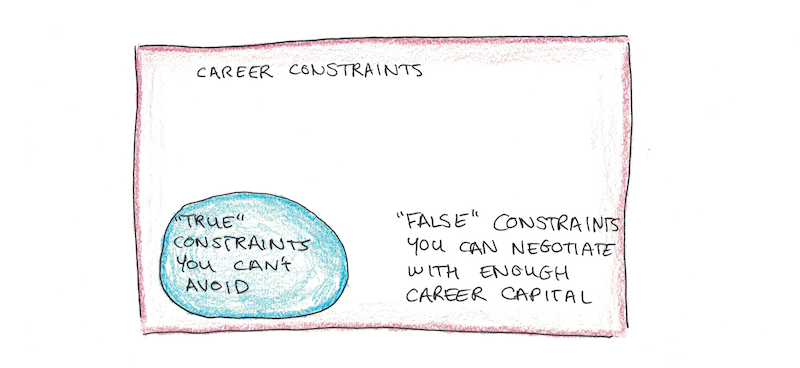Soon, Cal Newport and I will be reopening Top Performer for a new session. This is the course we teach that shows you how to deeply understand your career, build rare and valuable skills, and translate those skills into work you love.
In anticipation of the new session, I’ve been writing some lessons on career advice. I started by explaining why you should master your career rather than try to run away from it. I argued that you need to build rare and valuable skills, which don’t come automatically. I also showed why working harder can actually backfire, if that becomes your source of competitive advantage.
The theme throughout all these lessons is that to have a great career, you need career capital. Skills, relationships and other assets that make you in demand.

However, while getting career capital isn’t trivial, and it’s the main thing that separates the desirability of different careers, it isn’t the only step to having work you’ll love. Having career capital isn’t enough, you need to actually use it to negotiate the lifestyle you want to live.
What Kind of Lifestyle Do You Really Want?
For a lot of people, they never step back and really ask themselves what kind of career they want. Instead, they act like ambitious rats in a Skinner box, pushing the right levers to get short-term career rewards, without asking whether they want to be in that box in the first place.

I recently read this interesting story about someone who became a physics major “accidentally”, prodded along by the short-term competition to get grades, and then to get into grad school, he never really asked what kind of career he actually wanted.
I think this is actually a lot more common than most people realize. They get into a company that prioritizes working really long hours, so they start putting in hours to please the people around them, instead of asking whether this company is actually a good fit. Or they start chasing incremental promotions, without really asking whether a tiny bump in salary is worth the added responsibility.
In the first lesson, I made fun of people who chase illusions to get rich without adding value. But, in fairness, at least those people have a lifestyle they’re trying to create. They might be going about it in an ineffective way, but they at least know the kind of life they’re trying to build. Do you?
“But That’s Just the Way Things Are…”
Occasionally I’ll talk to someone who complains about the state of affairs for his or her work. The hours are too long. Vacations are non-existent. You can’t work from home or have flexible hours.
Implicit in these complaints is that this is just the way the job works. You don’t have a choice.
Of course, in some cases, they may be right. If your job is a wedding photographer, you can’t work from home. If you’re a programmer, you’ll be working with computers all day. Sometimes the constraints are intrinsically tied up in the actual work.
But for every person I’ve heard who complains that “this is just the way things are”, I know of others who break the rules. A good friend of mine negotiated part time work at a company to spend the rest of his time working on a personal project even though that was against company policy. I know of people who work from home, even when their coworkers can’t. I know people who work six months of the year and take the other six months off.

The real truth is that “this is just the way things are” is often really just a way of saying, “this is just the way things are for you.”
Most things are negotiable, provided you are rare and valuable enough to allow people to make you an exception.
Be Wary of Default Lifestyle Choices
Actually getting enough career capital to be able to make unorthodox lifestyle decisions is what’s difficult. However, there’s also plenty of people who have some career capital, but fail to use it when it comes time to pick where and how to work.
I can’t tell you what kind of lifestyle you should want. I had the opportunity, earlier on in my career, to work minimally and earn enough to get by comfortably. Instead, I decided I wanted to take on something more ambitious, so now I have a small team. I work harder now, but I also get to do things I wouldn’t have dreamed of a decade ago.
You might be the same, preferring to take on bigger challenges that really excite you. Or, you might prefer to work less, work from home, take more vacations or be more picky about what kinds of projects you undertake. Regardless, the choice is yours, provided you have the career capital to demand it and the willingness to negotiate it.

Top Performer will open soon. In the eight-week course, we will give you a plan to deeply understand your career (or career choices, if you haven’t yet decided), tools for mastering the rare and valuable skills which will propel you forward and teach you how to create work you love. Come join us for the next session.


 I'm a Wall Street Journal bestselling author, podcast host, computer programmer and an avid reader. Since 2006, I've published weekly essays on this website to help people like you learn and think better. My work has been featured in The New York Times, BBC, TEDx, Pocket, Business Insider and more. I don't promise I have all the answers, just a place to start.
I'm a Wall Street Journal bestselling author, podcast host, computer programmer and an avid reader. Since 2006, I've published weekly essays on this website to help people like you learn and think better. My work has been featured in The New York Times, BBC, TEDx, Pocket, Business Insider and more. I don't promise I have all the answers, just a place to start.